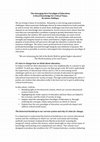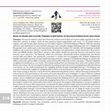Drafts by Julene Siddique

We are living in times of revolution. Humanity is now facing unprecedented challenges. Interconne... more We are living in times of revolution. Humanity is now facing unprecedented challenges. Interconnected challenges driven by interacting forces both systemic as well as social. Our ability to meet these challenges and overcome them will depend on our knowledge and commitment. Social sciences have shown that the way that you conceptualise a problem is going to greatly determine how you conceptualise the solution. We need more than knowledge; we need critical thinking coupled with constructive creativity. We need people with personal strength and integrity based on values and belief in a higher purpose. Only the deepest of motivations will persevere through the obstacles created by these immense challenges. We need a more profound level of motivation, more profound knowledge executed through integrity and solidarity of purpose. We need as much as possible, to nurture and support this emerging new paradigm of education.
New Paradigm Research (World Futures) by Julene Siddique
The Handbook of New Paradigm Research, 2017

Towards A New Paradigm of Health and Human Potential, 2018
View Published Article in World Futures Journal here:
http://www.tandfonline.com/eprint/Ni2Wfp9P... more View Published Article in World Futures Journal here:
http://www.tandfonline.com/eprint/Ni2Wfp9P5YdwPC7a3VeY/full
ABSTRACT
In today's highly dynamic and changing industries there are an incredible array of things converging, all of which are signalling a significant need for a new paradigm in health and medicine. Scientific revolutions have brought forward new forms of knowledge, which fundamentally oppose the premises on which the majority of our traditional medical institutions are based. Through my CIRR framework (Critique, Insight, Re-Define, Re-Structure) I will bring forward the key elements and principles of what this paradigm shift is and what would be involved in bringing it into fruition. There are 3 key elements of a paradigm shift which I will review through the CIRR framework these are a) structural and systemic elements b) dynamics of social constituents and pathologies and c) shifts in thinking that have given rise to new forms of knowledge that enable new forms of research and practice. I will demonstrate that the key elements involved in a genuine paradigm shift are here, however it's up to us to bring it into fruition. I hope to inspire both researchers and practitioners towards this new paradigm in health and human potential.
Papers by Julene Siddique

Arts and Education: Collected Papers 1: Challenges of Modern Educational Practice in the Field of Art: Current Issues, Dilemmas and Perspectives, 2021
All musical traditions stem from historical contexts and similarly all musical syllabi originate ... more All musical traditions stem from historical contexts and similarly all musical syllabi originate from their respective contexts. In today's world we have growing migrant populations with every 1 in 30 people being a migrant, and with Europe alone hosting over 82 million migrants (UN World Migration Report). With the growing relevance and importance of more inclusive education and culturally engaged pedagogy why isn't it happening? Recognized music syllabi such as the International Baccalaureate Program, for example, still homogenize multiple traditions into world music. Western musical theory, technique and performance remain dominant in IB as well as GCSE and ABRSM syllabus. World Music remains a side subject, despite the growing relevance and need for more inclusive music education. The hierarchy within the curriculum subordinates diverse backgrounds and diverse musical skills and talents. Not putting the curriculum in context and not engaging with students' backgrounds disables meaningful learning and even better learning outcomes. I propose 3 fundamental changes to systemically address inclusivity and to enable us to better unlock the benefi ts of diversity in music education. 1. Teachers adopting an approach and attitude as a co-learner. This includes putting their own background as well as the content of their lessons into context. No one is an expert on diversity. By putting content into context and adopting an attitude of being a co-learner, we can create environments for engaging diversity through meaningful learning. 2. Developing new curriculum frameworks capable of correlating diverse forms of musical practice. Diversity and inclusion will remain 'side issues' as long as diversity is not built into the syllabi and educational system. I will put forward a framework for a new musical curriculum based on the science of sound and performance modalities in context. With the unifying factor being the science of sound and viewing diverse forms of music making as diff erent performance modalities in context, we can establish two major pillars working towards the development of a new musical curriculum capable of acknowledging, including and systemically engaging diverse forms of musical skills and competencies. 3. Putting the student's needs at the centre (rather than a strict curriculum). The purpose of developing a curriculum capable of diverse forms of musical skills and practices is to provide the ability to better adapt content around the needs of the students' growth and development more holistically. By working with diverse modalities of music making in context and unifying them through a musical theory based in the science of sound, we can begin to create a curriculum which is universal and yet has the capacity to include diverse musical traditions, nurture diverse musical skills and talents. Working in this way, we can on a case by case basis choose musical modalities and musical practices which are most relevant and meaningful to students' growth and development. This new framework attempts to address the systemic factors preventing inclusion in education but also holds exciting research prospects for reinventing musical theory, and increasing prospects for supporting cognitive development in students.

Cadmus Journal, 2021
Social theories and humanitarian movements, despite their good intentions, have had limited effec... more Social theories and humanitarian movements, despite their good intentions, have had limited effectiveness. This paper introduces Socio-Systemic science as a conceptual and implementation framework designed for effective high impact systemic action. The science of Socio-Systemic impact is led by the Social Architect who understands how to consciously catalyse key drivers of systemic change. The rise of a systems-based worldview forms the basis of a new way of understanding modern problems, inferring the kind of thinking and leadership required today. The Social Architect is a new entity in this development, working to apply grounded sociological science and understandings of natural systems to improving the human condition. Where traditional activism falls short through structural illiteracy and continually stumbles in engaging mere symptoms of world issues, the Social Architects act as the compassionate analysts addressing the systemic causes of world issues. We can no longer turn a blind eye to structural violence and systemic failure. Inside the dark heart of structural violence are the keys of societal re-architecting that are in fact our only hope out of it. The first part of this paper outlines the science of Socio-Systemic impact. The second part explains how to put the science into practice; reviews current implementation methods being deployed by leading Social Architects; outlines the key skills and roles of the Social Architect working individually as well as strategies for integral systemic action, and, lastly, suggests further action strategies and prospects for the future.

Eruditio, Volume 3, Issue 1, 2021
To powerfully access humankind around the world to act systemically, we must engage an authentic ... more To powerfully access humankind around the world to act systemically, we must engage an authentic critical praxis, reflecting on direct experience in connection with strategic action. Only by understanding power can we transform it. Through the development of critical cultural action, everyday people learn to understand power; how its structures are embedded in society; and, then, have the knowledge to take effective local action. Creative, somatic and sensory information are crucial and powerful aspects which have been left out of most efforts for social change and which hold much potential for healing, social transformation, social justice and systemic action in the everyday. An emphasis on embodied praxis makes the entirety of the human being relevant and meaningful and enables a humanising global agenda that incentivizes us to explore all dimensions of our humanity. A global grassroots curriculum with a profound humanising incentive coupled with somatic competencies, enables us to cradle the traumatic wounds of our global crisis that keep populations divided, and can set a solid foundation for transformative global healing and social change. The acknowledgement and embrace of our suffering in a meaningful and intentional way can go hand in hand with the transformation of it. Cultures imbued with a critical, embodied artistic praxis can cultivate deeper understandings of what it means to be human, of possibilities for human development, and new possibilities of ways to relate to ourselves as well as to each other and hence open important pathways towards a new social architecture. The smallest incidents of our social life contain all the moral and political values of society, all its structures of domination and power, all its mechanisms of oppression.

Cadmus, 2020
In response to the new socioeconomic conditions and the planetary momentum for change induced by ... more In response to the new socioeconomic conditions and the planetary momentum for change induced by our multifaceted crises, humanity needs to synthesize its knowledge and synergize its action into a coherent and coordinated global movement and new leadership. Toward a new paradigm of human development aligning global societies with planetary systems, sustainability needs to be practiced as an art of systems change, engaging all the creative capacities of the arts and the mobilizing powers of culture. The paper addresses how to engage the impact of the arts and culture for integral societal transformation. It puts forward 'the systemic engagement of the arts' as a new working framework which encompasses multitudes of practices and methodologies not previously correlated and scaled. Recognizing the arts as a social knowledge system, the paper argues that they are vital to the formal SDGs implementation and a pathway to a new social architecture. The future will arise from the quality of our being and quality of human decision. The paper outlines a set of key integral strategies with demonstrative examples to show how the arts can be engaged as a holistic system with threefold impact that is deeply transformative, broadly adopted, and with long-wave socio-cultural shifts. Addressing the dehumanising forces of our crisis through the empathetic powers of the arts, systemic engagement of the arts and culture opens a way forward to a more humane future and the possibility for humanity's multifaceted accomplishment.
Books by Julene Siddique
Catalytic Strategies for Conscious Social Transformation, 2023
This collection of essays examines the unprecedented reach, magnitude and complexity of global ch... more This collection of essays examines the unprecedented reach, magnitude and complexity of global challenges—political, economic, technological, social and environmental. It advocates fundamental changes in theory, research, public policy, and institutions, and advances new thinking on global leadership, human security, human-centered economics, and human rights. The book also proposes measures to break down the barriers between academic disciplines and between research and policy-making, and reconciles the objective facts of science with the subjective truths of the arts and human values. It replaces mechanistic analytic thinking with integrated knowledge, bridging the divide between abstract theory and the living complexity of social reality.











Uploads
Drafts by Julene Siddique
New Paradigm Research (World Futures) by Julene Siddique
http://www.tandfonline.com/eprint/Ni2Wfp9P5YdwPC7a3VeY/full
ABSTRACT
In today's highly dynamic and changing industries there are an incredible array of things converging, all of which are signalling a significant need for a new paradigm in health and medicine. Scientific revolutions have brought forward new forms of knowledge, which fundamentally oppose the premises on which the majority of our traditional medical institutions are based. Through my CIRR framework (Critique, Insight, Re-Define, Re-Structure) I will bring forward the key elements and principles of what this paradigm shift is and what would be involved in bringing it into fruition. There are 3 key elements of a paradigm shift which I will review through the CIRR framework these are a) structural and systemic elements b) dynamics of social constituents and pathologies and c) shifts in thinking that have given rise to new forms of knowledge that enable new forms of research and practice. I will demonstrate that the key elements involved in a genuine paradigm shift are here, however it's up to us to bring it into fruition. I hope to inspire both researchers and practitioners towards this new paradigm in health and human potential.
Papers by Julene Siddique
Books by Julene Siddique
http://www.tandfonline.com/eprint/Ni2Wfp9P5YdwPC7a3VeY/full
ABSTRACT
In today's highly dynamic and changing industries there are an incredible array of things converging, all of which are signalling a significant need for a new paradigm in health and medicine. Scientific revolutions have brought forward new forms of knowledge, which fundamentally oppose the premises on which the majority of our traditional medical institutions are based. Through my CIRR framework (Critique, Insight, Re-Define, Re-Structure) I will bring forward the key elements and principles of what this paradigm shift is and what would be involved in bringing it into fruition. There are 3 key elements of a paradigm shift which I will review through the CIRR framework these are a) structural and systemic elements b) dynamics of social constituents and pathologies and c) shifts in thinking that have given rise to new forms of knowledge that enable new forms of research and practice. I will demonstrate that the key elements involved in a genuine paradigm shift are here, however it's up to us to bring it into fruition. I hope to inspire both researchers and practitioners towards this new paradigm in health and human potential.